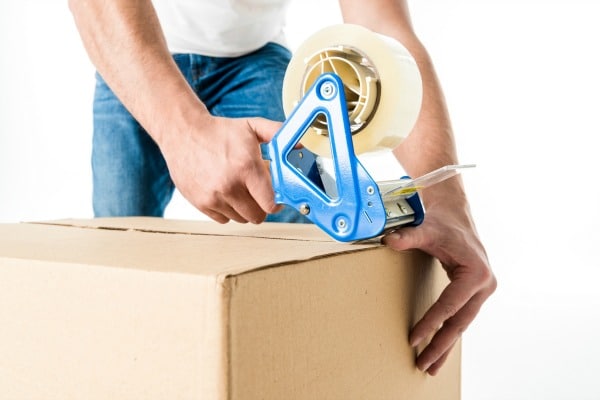This is a sponsored post written by me on behalf of Navy Federal Credit Union for IZEA. All opinions are 100% mine.
If you know how to budget for a move, you can reduce the stress of moving significantly. There’s no doubt moving is stressful, but it can be a very positive change if you head into a move prepared.

During my husband’s career in the military, we’ve moved a dozen times. With my husband’s retirement from the military looming before us, so does one final move.
Facing this major transition, I’m doing everything I can to plan and prepare for the changes that lie ahead of us. In the process, I want to share some of the helpful tips I’ve picked up along the way from our previous moves.
I’ve previously shared some of my favorite moving tips, but today I’d like to focus on what for me, is the most stressful part of moving — the cost.
Why You Need to Budget for a Move
Because military life is pretty stressful, I’ve filled out my share of Holmes-Rahe Life Stress Inventory worksheets. If you’re not familiar with the tool (also known as the Social Readjustment Rating Scale), the way it’s set up is that it assigns a score to various life events (both positive and negative) that create stress in our lives.
The death of a spouse carries a score of 100, whereas getting a speeding ticket registers as an 11. To calculate your score, you circle all of the items that have happened in your life during the past year and add the values for each. The higher your score, the higher your odds for experiencing a stress-induced health breakdown.
Moving to a new home carries a value of 25, which isn’t alarming. However, moving also usually means new schools, new churches, and new social groups, ratcheting that score up to 82. If you happen to take on a mortgage for your new home, you’ll be up to 113.
Thankfully, a score of 150 or below is still considered a low risk of stress-induced illness. However, if you experience a major change in financial state as a result of a move, your score jumps from 113 to 151, putting you at a 50% chance of a major health breakdown in the next two years.
So, though you might be a “roll with the punches” type of person, when it comes to moving, you need to take a more proactive approach. Because financial strain is the most stressful aspect of a move, if you learn how to budget for a move, you’ll not only be protecting your assets, but also your health.

How to Budget for a Move
As a military family, we’ve moved a LOT. Thankfully, the military tries to offset many of the expenses related to moving.
Unfortunately, those moving allotments rarely cover ALL of the costs of moving. It’s important to understand before you move, which expenses your employer is helping cover.
Standard Moving Expenses
Whether you’re moving yourself or hiring a moving company, it’s not hard to do the broad math. A moving company will typically give you a good estimate of their packing and shipping fees. And you can pretty easily calculate the cost of renting a truck and/or trailer, gas, and packing materials you’ll need.
Here’s a brief summary of the expenses you’ll incur during an average relocation:
Moving Company Expenses:
- Labor costs for packing and loading
- Travel fee
- Packing supplies
Do-It-Yourself Moving Expenses:
- Truck rental
- Gas
- Equipment rental (dolly, ramps)
- Packing materials
Other Standard Moving Expenses:
- Insurance
- Storage fees
- Flights and/or lodging
- Temporary housing
What you might not be prepared for (I certainly wasn’t!) are all of the hidden and unexpected fees related to moving. These are the expenses you don’t think about until you have to pull out your credit card or checkbook to cover them.
Often Overlooked Moving Expenses
For the first three or four times we moved, there were several costs I consistently forgot to budget for. Sadly, these expenses really add up!
Don’t get caught off guard and thrust into debt. Make sure you as you prepare for a move that you remember to budget for these things:
Meals:
In the last couple of weeks before a move, most of us concentrate on using up all of the food in our fridge and pantry so it doesn’t go to waste. This means that in the final days of the move and during the move, we’re likely to end up eating out a lot or buying a lot of convenience food.
Also, if you’re hiring movers, it’s never a bad idea to keep them well fed and hydrated on moving day so you’ll want to budget for that too.
Condiments/Pantry Items:
In your regular shopping, condiments like ketchup and soy sauce don’t make a big dent in your budget. But when you move, you have to replace all of those items at once unless you’re only moving a short distance and can easily transport all of the contents of your refrigerator.
Likewise, most movers won’t move any pantry items that aren’t sealed. Even if you’re moving yourself, you might not want to risk insects and rodents getting into your things by moving open containers of flour, sugar, and rice.
Our first grocery shopping trip after a move is always double or triple our normal cost. Make sure you budget for restocking your kitchen.
Liquids:
For the most part, movers won’t move liquids and you probably won’t want to either. Many liquids, from nail polish to household cleaners, are flammable or explosive.
Even if you’re moving in the middle of winter and heat isn’t a concern, liquid spills and leaks can cause a lot of damage. I’d much rather spend a couple of dollars to buy a new container of bleach than to risk it leaking and ruining an entire box of clothes or our couch.
Every time we move I’m amazed at how many liquids we use throughout the house.
-
- Bathroom – shampoo, conditioner, body wash, cleaners
- Kitchen – dish soap, cooking oil, vinegar, wine, sauces, cleaners
- Laundry room – detergent, bleach, stain remover
- Garage – paint, weed killer, motor oil, gasoline
As you know, a lot of the items listed above can be expensive. Avoid buying new items too close to moving day to reduce waste, and budget accordingly to restock them after the move.
Other Hazardous Items:
While we’re on the topic of items that are dangerous to move, we might as well finish the list. In addition to the liquids above, the following items are also considered hazardous to transport:
- Aerosols
- Ammunition
- Batteries
- Charcoal
- Fertilizer
- Fire extinguishers
- Matches
- Propane tanks
Like everything else mentioned earlier, plan to use up these items and/or give them away before your move. Then, budget to replace them after the move.
Deposits:
One of the bad things about moving is that no one knows you yet in your new location. As a result, you have to re-establish your credibility. It’s quite likely that your new water company, cable provider, and phone service will ask for a deposit when you call to establish service.
At worst, you’ll have connection fees, costs you won’t recuperate later. Often, you’ll have to pay a deposit which will either be credited to your bill later or possibly, won’t be returned until you discontinue service.
Ideally, well ahead of your move you will be able to call ahead and find out what these fees are ahead of time so you can budget to cover them.
Child and Pet Care:
If you have kids or pets, you know how expensive sitters can be. During your preparation to move and perhaps on moving day, you’ll probably want to make arrangements for your children and pets so they aren’t underfoot while you are supervising or loading the moving truck.
In addition, you may need care on the other end of your move when you are in temporary housing or setting up your new home. Don’t forget to plan for how to care for your kids during the move so you can budget whatever is necessary to cover any additional costs related to that care.
How to Save Money for a Move
Hopefully, the information above hasn’t sent you into a panic. Yes, moving can be expensive, but the purpose of the list was to help you prepare for the costs you might face. This way, you can plan ahead to mitigate those costs and to make sure you have enough money to cover them.

Start with a Solid Financial Plan
In a perfect world, we’ve all been doing exactly what we should be doing in every aspect of our life. If that’s you, congratulations! You’re my idol.
In reality, most of us do okay in several areas, and we struggle in others. Sometimes we do okay for a while and then lose our way and have to refocus again later.
No matter where you are on your financial journey, Visit MakingCents for clear, step-by-step information to help you meet your financial goals.You’ll find practical tips and resources to help you:
- Improve your finances
- Get out of debt
- Manage credit
- Make major purchases
- Build savings
It’s essential that you get a handle on your finances BEFORE you budget for a move so that you’ll be able to create a workable plan instead of setting unrealistic expectations.

Mitigate Expenses
Using the list of expenses outlined in this post, figure out which expenses you can eliminate or cut down. For example, you can save on packing supplies by getting boxes from local stores. Or, post a “Wanted” ad on Craigslist or in local Facebook groups to pick up boxes and packing materials from someone who has recently moved and needs to get rid of those items.
Reduce your moving costs by moving less stuff. Get rid of as much as possible before you move. Consider hosting a yard sale to earn some money for your moving budget while you unload unwanted items (and unnecessary shipment weight)!
Barter with your friends and neighbors. Offer to watch your friend’s kids for a weekend long before your move so she can get away for a second honeymoon. In exchange, she can keep your kids on packing and moving days.
Start a Moving Expenses Fund
As soon as you know you’ll be moving, start setting aside spare cash. Whether you simply save spare change or you’re able to set aside a small sum each paycheck, dedicate yourself to saving something extra to cover your moving expenses.
We set up our retirement move savings with Navy Federal Credit Union. Become a Member if you aren’t one already. They have great rates!
If you end up saving too much, you can always roll it into a major purchase for your new home or into a vacation fund. Better to have too much money, than to find yourself in a situation where you have to rack up credit card debt or take out a loan.
Moving is definitely stressful, but can also be a fun, new adventure. By taking a few, simple steps to budget for your move, you’ll help ensure a smooth and pleasant transition to your new home.

